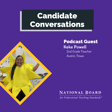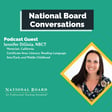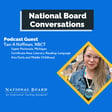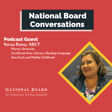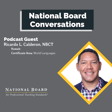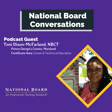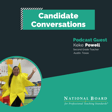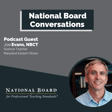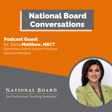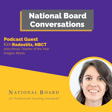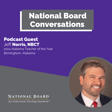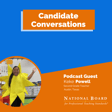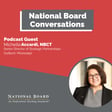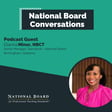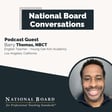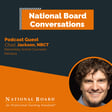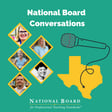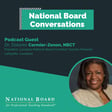Become a Creator today!Start creating today - Share your story with the world!
Start for free
00:00:00
00:00:01

Milton Alan Turner, NBCT - High School French Teacher
Milton Alan Turner is a National Board Certified teacher in Cleveland, Ohio. A veteran educator at Saint Ignatius High School in Cleveland. In the episode, we talk about his path to certification, his love of science fiction, and ways to try and rebuild the Black teacher pipeline.
Don't miss out on all National Board related updates; follow us on social media to keep up!
Twitter: @NBPTS
Instagram: @NBPTS
Facebook: The National Board for Professional Teaching Standards
Transcript
Introduction and Partnership
00:00:00
Speaker
What's going on everybody? Welcome back to National Board Conversations. Recently the National Board was awarded a grant with the Center for Black Educator Development to assist in rebuilding the black teacher pipeline.
Milton's Journey in Education
00:00:10
Speaker
On this episode of National Board Conversations I speak with Milton Allen Turner. He is part of the 1.3% of educators identifying as black men and is in an even smaller group of black male MBCTs.
00:00:21
Speaker
Milton Allen joins me from Cleveland, Ohio to discuss his journey in the classroom, his path to national board certification, and what the national board can do to assist in rebuilding the Black Teacher Pipeline. I won't hold you much longer. Here's my conversation with Milton Allen Turner.
00:00:39
Speaker
Milton Allen Turner, thank you for joining me on the podcast. I'm excited to have you on. Well, my pleasure. It's great to be here. All right, so we'll get right into it. What is your current role and give a brief image for yourself? And then I got a few questions to get a little bit more on the personal side. OK, great. I teach French and Spanish at St. Ignatius High School in Cleveland, Ohio. I've been teaching there for 37 years, although not always as a teacher. I spent three years as an administrator, then went back in the classroom.
00:01:08
Speaker
And I've also done some post-secondary teaching. I started off actually at Clark College in Atlanta teaching where I first got the education bug and then got convinced to move back to my hometown of Cleveland. And then I've also taught some education and French classes at Cleveland State University.
00:01:28
Speaker
So originally in high school, I thought I was never going to teach. I thought I was going to be an attorney. And I'm 60 years old. I think my mother still thinks one day I'm going to go to law school.
Return to Teaching and Passion
00:01:36
Speaker
But once I first started teaching, just that aha moment and seeing students get it, I got the bug. And it's kept me there for 38 years. That's awesome. That's awesome. So you said you went to administration and then back to the classroom. That's not something that happens very often when they go back to the classroom.
00:01:52
Speaker
I can't deal with dumb adults, but I understand that students don't understand things and that's part of the job is to help them come to an understanding and a clarity. I ran into too much groupthink in administration. I also insisted on teaching one class while I was an administrator. I kept teaching AP French
00:02:12
Speaker
literature at the time and because I thought it was important to be on bell time as well as clock time to understand first second third period and not just 12 o'clock and 1230 and for some administrators that was a problem and they thought well you need to choose you need to be either a teacher or an administrator I'm like well why can I be both and when forced to choose that actually I um the person that replaced me ended up leaving and so I decided well rather than hiring another French teacher
00:02:40
Speaker
I'm going to go back in the classroom and hire another administrator.
Culinary Favorites and Music Therapy
00:02:44
Speaker
I'm happy you're there. Actually, the dirty little secret is administration is easy. An administration, you've got administrative support. You've got time. It's in the classroom where you're on the high wire and doing everything by yourself. It's hard, but like the movie A League of the Rone, that's what makes it great. It's supposed to be hard, but that's the fun part. Administration is not that challenging.
00:03:09
Speaker
Okay, okay, okay, okay, so what are your three favorite foods?
00:03:13
Speaker
Oh, my favorite food. I love almost any kind of chicken. Yeah, normally fried, but fried, baked, roasted as any kind of chicken. John Beliah and Shrimp Creole. I'm a real big Louisiana. Oh man, I just got right from New Orleans. Louisiana, New Orleans, and Montreal are like my two, in North America, those are my two favorite cities to eat. The food is just phenomenal. I eat myself silly.
00:03:39
Speaker
I gotta go to my tribe grew up in Massachusetts Springfield, Massachusetts about four and a half hours south of Montreal I've never been but I have a bunch of family from New Orleans. I've been there quite a few times. Oh Yeah, it's like the spicy the but oh yeah, I love a good Chambala Alright three songs that define you
00:03:59
Speaker
three songs that define it. I'm an old school funk fan, so P-Funk, Parliament Funkadelics, one of my favorites, the live version especially. But then I also love jazz and jazz fusion, so actually the last week I've been thinking a lot about this other romantic warrior with Return to Forever.
00:04:19
Speaker
largely because I was thinking that L.W. Yellow, the guitarist that was in the group with Stanley Clark and Lenny White and Chick Corea, had a heart attack, but that was one of the first songs for me where the group got funky all on acoustic instruments. So before we were jazz fusion, I was used to Herbie Hancock and synthesizers and the thumping bass, but this was just four acoustic musicians getting down and getting funky in jazz on acoustic.
00:04:47
Speaker
And I also love Brazilian music. So Javan Stigano is a song I love, but just the double entendres of talking about being a gypsy and yeah, as my girlfriend says, I'm sort of a I'm a closeted musician. I play a little bit of keyboards and bass and guitar, but there's been a group just for myself. I had a heart attack about 15 years ago from being a bad smoker for years and finally stopped and I needed to
Unexpected Career and Student Engagement
00:05:16
Speaker
have a good habit to replace that. So I got a little bit more heavily into music. So it's just my therapy. I get in my keyboards or my bass or my guitar and just play for me to just, that's my therapy. That's my relaxing time. Oh, I love that. I love that. I love that.
00:05:31
Speaker
And the one sports team that has your heart and if you're a sports person, you're a book character. I'm a Clevelander, so the Cleveland Guardians. I've been a baseball fan my whole life and I learned it from my mother. Most people learn baseball and sports and things from their father, but my mother grew up
00:05:51
Speaker
in southeast Missouri and her father was a Negro Leagues catcher so it just baseball was sort of in my blood and family and my mother was teaching me how to keep score things I was younger so I've always been a baseball fan from that but just still haven't seen a championship in my lifetime and still 95 and 97 and 16 so still hoping
00:06:12
Speaker
Like, they're giving you hope that they can get there. So it's just like over the hump. And it's typical being a Cleveland fan, except for thanks to LeBron coming back and getting the basketball championship. But every year, it's like maybe next year, the Browns. Oh, maybe next year, the Guardians. Maybe next year, we always have hope. We're resilient in Cleveland. I like it. I like it. All right, so.
00:06:33
Speaker
You spoke a little bit already. You didn't expect to become a teacher. You was expecting to be a attorney or a lawyer or any of that stuff.
National Board Certification and Mentorship
00:06:39
Speaker
When you become a teacher, what makes you remain in the classroom? I became a teacher by accident. When I was in college, I studied languages. I was a French and linguistics major, did my junior year abroad at Nice. And I thought I was going to be, again, either international attorney or maybe foreign correspondent getting into journalism.
00:07:00
Speaker
But when I studied abroad, living in France and coming back, my whole viewpoint changed. And so I didn't know whether I wanted to go into corporate law anymore. I got a much more acute sense of social justice and other things and just decided that probably wasn't for me.
00:07:19
Speaker
Now they sort of call it a gap year, but after I graduated, I went and lived in Atlanta with my brother and father and did all kinds of odd jobs. And one of those ended up being teaching part-time. My brother was a senior at Clark College, and he wanted to introduce me to his French teacher at the time, so after I studied in France and came back.
00:07:36
Speaker
We got to know each other and an opening came up where one of their teachers had to go on medical leave. So they needed somebody to replace the teacher for the remainder of the semester. And so I was doing that while bartending and doing all kinds of odd jobs and thought, well, this is just a way to pay the bills. But as I said, I got the bug just.
00:07:54
Speaker
seeing that excitement in some, again, a lot of students aren't excited and don't care, but seeing those students that are excited, that want to get it. And when you can explain something and you get that aha moment that sort of hooked me into it. And then by accident, my old French teacher here in Cleveland found out that I was teaching down there and through my mother and family members had let me know that there was an opening at my old high school.
00:08:19
Speaker
when I was a student then. So I came back and interviewed and 37 years later, I'm still there. And it's largely because of the students that every year, even if you're teaching the same material, the students are different, the experiences are different. And even after 37 years, I don't know what to expect. There's always something that surprises me. They always come up with, I can expect 70 to 80% have a pretty good idea what's coming, but there's that 10 to 20% where it's like, damn, I didn't expect that.
00:08:48
Speaker
Keep me honest and keep me on my toes.
00:08:52
Speaker
Oh man, that's awesome. And now you're national board certified, so what puts you to pursue certification? Actually, I'm a mentor teacher. So like the French teacher that convinced me to come back to Cleveland, who was my former French teacher, was an AP reader. And so because of him, I ended up becoming involved in the AP grading and national organizations. And he had told me about this national board.
00:09:18
Speaker
program that was going on. At that time, they didn't have it in languages yet. They were still experimenting and were planning on having it in languages they hadn't quite. From his input, I decided to keep following along with it. When they did the first year,
00:09:35
Speaker
Just out of accidentally I couldn't I wasn't able to complete the certification. The first year apply the first year logic is Ohio was paying for it, but then there were my application got stuck. It didn't get through. I didn't get the.
00:09:50
Speaker
So then the next year, the second year, I was able to hook up with several teachers in Cleveland who were language teachers through Ohio Foreign Language Association, who got certified the first time through. And so God's hand in there said, let me go on through the first time because it's setting up with a year. And then I got to meet three other teachers who went through the process, got to learn from their experiences. And so I was part of the second cohort year of language teachers or French teachers and was fortunate enough to make it the first time because
00:10:20
Speaker
I heard particularly that time in the early 2000s, not only was the passing rate very low, but even lower for minorities and even more so in languages. And so fortunately, listening and following these three colleagues' suggestions, I was able to make sure that my portfolio had what it needed and dotted my eyes and crossed my T's and was fortunate enough to make it the first time through. So you achieved on your first try? Yes.
Challenges in Public Education
00:10:46
Speaker
And largely thanks to the input of, there was a mentoring system in Ohio and I did, and nothing against the matter that I had. She was very good, but it was sort of like a history or generic manner. So it helped on some of the notes and bolts and how to go through the old box and the filling up the forms and everything. I was experimenting with bringing something similar to the box.
00:11:09
Speaker
I actually enjoyed the box when I went through renewable going online that I had more problem with but there was something sort of comforting about putting everything together in the box and seeing physical artifacts of everything that I did.
00:11:24
Speaker
I complained about it when I did it. It's like working out or exercising. I hate doing it, but I like having done it. So the box was a pain going through it. But afterwards, like, damn, this is pretty impressive. It's like reassuring. It's like, oh, man, like I'm submitting all of this work. Exactly. Well, when you put it online, it's like, did it go through it? You really don't. Right. You don't see the magnitude of it or the full scale of it when you're just uploading documents. But yeah, when you put the box in the
00:11:50
Speaker
the two VHS tapes in there. Yeah, it wasn't even CDs at the time. I'm holding up where it was VHS tapes my first time through. Oh man. So what was the most helpful coaching conversation or resource or piece of advice you think you received while you were going through the process?
00:12:08
Speaker
The best piece of advice I had was always going back to the students that there were certain things that I was doing and we as teachers will always get caught into it through our systems and administration that we do things that may help the district or help us as teachers, but.
00:12:23
Speaker
for the National Board process, it was how does this affect the students and student learning. And if it doesn't help the students, take it out, focus on something else. So it was really a moment of clarity of how does what I do affect my students and help them become better learners. And that, for me, was a very important focus. We have a limited amount of time to do things. And some things I had to let go, where it's like, yeah, this isn't helping me in my classroom. It's not helping my students. I don't need to be involved in it.
00:12:53
Speaker
No, that's, that's right. And we, like, one thing we like to, well, other MCTs have talked about is involving your students in the process. Exactly. I mean, them involved makes it not only easier on you, but it gets them more intrigued and being better and things like that. So it's definitely something to think about.
00:13:12
Speaker
And that's one of the things for me, involving the students in it, I found fascinating and important because it reinforced their sense of worth and importance. It's like, not only is my teacher going for this thing, but he thinks I'm important enough to then involve me in the process and explain the process so well. If I've got this teacher going for this advanced certification, then I must be worthy. I must be great. And all students are. But the more that we can convince them of that, because one of my big worries in education is that,
00:13:41
Speaker
We're really creating a system of have and have nots. And there are some students in, and I teach in a public school, I mean, in a private school. But it really bothers me that public education is being devalued and we're not putting the money, resources and respect in the public education that we need. And I'm afraid we're going to have to pay for that in that generation. So that bill is coming. And unless we really pay attention to give all students the quality education that we need, we all are going to suffer.
Decline of Black Male Educators
00:14:12
Speaker
So how did becoming an NBCT impact your career? On the one hand, it opened up a lot of professional activities. It made me much more involved in national organizations. I attended a couple of the national conferences. It made me more involved in national organizations. The first couple of years, it was nice. Also in Ohio, for a few years, we did end up having a pay increase, although that disappeared pretty quickly.
00:14:42
Speaker
But for me, the most important thing, more than the pay increase, they also got rid of support for teachers initially applying. And that's something I'd really like to see come back, is that even though the prices have gone down, it's a five year now instead of the 10 year, a lot of the barriers are being removed, it's still for some teachers that initial payment can still be a big deal. And I'd love to see our state at least go back to that, at least funding.
00:15:06
Speaker
the process to let teachers get in because that's a huge barrier for some teachers, particularly younger teachers. But for me, it opened up a lot of networking opportunities to be able to connect with other teachers and also to begin to work with younger teachers. But that pipeline is getting there were fewer people are coming through there. And as much as we're trying to get people through, it's getting harder and harder.
00:15:32
Speaker
And frankly, if I were in college right now in my 20s, I'm not sure I'd go into teaching. I'd be thinking long and hard about it. Yeah, it's tough. It's tough. So you're a big sci-fi fan. So first question, DC or Marvel Comics? Oh, I'm DC. And I love both. But growing up with DC, Marvel
00:15:55
Speaker
particularly as a young black man. I didn't read comic books to read about somebody else's problems. I didn't care that Peter Parker couldn't pay his rent or something. I read comics to read somebody kick somebody's butt. I want Batman to kick the Joker's butt. I want Superman to beat Luthor. So I wanted the great archetype heroes in Good and Evil. I didn't want to know about the problems. Now just, I want to see some buck whoopin'. Yes, I'm here for it. Who are your three favorite characters?
00:16:20
Speaker
Well, the Batman was one of my big ones, big fan of that. The Green Lanterns, originally Hal Jordan, but eventually as well John Stewart, just the idea that with your mind and your will, you can construct and create anything. I just love it. There's a young black man, I just love that. It's like, I can make anything I imagine come into reality. And Hawkman, the Thanagorian warrior, just like. That's great, I like it. It's just always like, and it wasn't originally at first the original versions of Hawkman,
00:16:49
Speaker
or the classic Golden Age that was a re-encoded Egyptian god but the fenegorian warrior from another planet was like oh okay that's kind of cool he's just the badass warrior. I love it. So have you ever used science fiction in different languages in your classrooms?
00:17:05
Speaker
I've tried to. What I often do is, if not, because there are some, like Pierre Boulog wrote the Planet of the Apes, and sometimes I'll use some excerpts of that, and well enough, say, Jack, a couple of fantastic writers. But what I often do in languages, we spend a lot of time talking about perspectives and getting students to understand the perspective of another.
00:17:32
Speaker
And so I often joke that, particularly in science fiction, understanding the perspective of black sci-fi fans, a black sci-fi fan or time traveler is never going into the past. For black people, it's always about the future. And so the more that we can understand why that's the case, the why for many people of color, there were no good old days in the past and we always want to see
00:17:55
Speaker
something better that we're always looking for the better. Well, again, for some people of privilege, yeah, the past might be nice to go back and revisit. But with me, it's like, oh, no, there's nothing in the past. I want to see a revisit again. I've just always got to hope the future is going to be better. Thanks. It was all bad. Thanks. All right. So you talked about you're a blackmail in the classroom, very rare and becoming even more rare nowadays.
Making Education Appealing
00:18:22
Speaker
What do you think has been the leading cause behind the decline of blackmail educators?
00:18:28
Speaker
Money, as my grandmother used to say, money can't buy everything but poverty can't buy a damn thing. That for many black males that sit in college in their 20s, if you're looking at different opportunities and what's available,
00:18:43
Speaker
Why would you go into a profession that pays next to nothing and now has very little respect? At least 40 years ago, when I started, the pay wasn't great. But in the community, people said, oh, well, you're a teacher. That was something that was respected and honored in the community. That's really not the case anymore.
00:18:59
Speaker
It's almost you're going to the teaching why you fool going to Going to banking or law or medicine or something else. It's even there's not a prestige in it anymore and so I think it's that double whammy of the time that you're gonna have to take to go in and get a degree or probably a Master's degree in education as well as in your field to start off and get paid 50 to 60 percent less than you want another field and to be disrespected by the general public and by school
Role and Respect for Teachers
00:19:29
Speaker
boards
00:19:29
Speaker
It it's just a bad combination. Yeah, like it's
00:19:36
Speaker
And also like, I feel like the kids are more disrespectful. So you're just not getting any kind of leeway and any grace anywhere. Right. And normally that should be your, your haven of your race as you go in and with the students. But right. But even if the students are starting to disrespect you, because they're buying into, Oh, well, those who can't do and those who can't teach. So I've got the leftovers here in front of me instead of.
00:19:59
Speaker
recognizing that this is somebody who's got skills and is there to help them achieve their best selves. Yeah, that just because they're just monitoring what they see. Right? They're just hearing what what the society with the parents and others are saying that and normally this it takes most teachers end up
00:20:16
Speaker
good teachers are able to chip away at that. And then the students see beyond that. But right, their first day in the classroom, all they hear like teachers and teachers unions are incapable people that can't make it anywhere else. And they just want the summer vacations and the days off. All right, so
00:20:33
Speaker
What are the few things schools can do to become more welcoming to Black male educators? Well, hopefully what they can do is maybe follow what some of the other fields do. Like here in Cleveland, there's a lot in health care with Cleveland Clinic and University Hospitals. And so they do things like increase pay.
00:20:53
Speaker
loan forgiveness, helping with housing or low cost mortgages or housing allowances, just maybe things like that in education for thinking out of the box of just, if you're going to go into education, we realize you're not beginning the pay that you need, but
00:21:09
Speaker
bringing back things like after five, six years, having some loan forgiveness or having help in getting housing or low interest mortgages to get it to become part of the community. There's something to help supplement that. And also to bring back some of the respect to show these are things that show we value you and we value education, value what you're going to do for our students, where we seem to be doing that in medical professions and others, but not in education.
00:21:34
Speaker
No, that's exactly right. There just needs to be more opportunities because teachers affect every profession out there, right? Exactly. None of them are available without a solid, qualified educator. So we should pay them though because
00:21:52
Speaker
They do literally create every other job out here. Exactly. There was one for a teacher to create the spark, right? Then the students wouldn't go on to something. Everybody had a teacher somewhere that pushed them and convinced them that they could do it. And we need to keep that going. If the teachers go away, as I always said a word, if we don't have those teachers, then what's going to happen to society? We don't want to have a bunch of second rate engineers and doctors. We want to have everyone
00:22:20
Speaker
be the best they can be. We don't want second-rate engineers creating our bridges or you get sick and go to the hospital after being operated by the lowest doctor. We want everybody to be high quality and have good education for everyone and not just doing things on the cheap. You can't have YouTube doctors and YouTube engineers. It's kind of nice to say, well, you can go out and Google it, but
00:22:42
Speaker
You still need that wisdom and that's where teachers are the most important.
Cleveland Restaurant Recommendations
00:22:46
Speaker
I always joke that school isn't about learning or knowledge, it's about wisdom. We want to eventually give the students to the point where they can recognize what's right and what's wrong, what makes sense and what doesn't. Basically give them a BS meter to go, okay, that makes sense.
00:23:02
Speaker
You know, that doesn't quite make sense. And it takes a long time to do that. And that's where the teachers, real job, anybody can find the information, but the teach them how to sort through the information and evaluate it and say, this is how the world works. And no, this isn't how the world works. Somebody's feeding you a line of bull.
Importance of a Teaching Career
00:23:23
Speaker
All right. So you've talked about it. You're from Cleveland, born and raised. No, once I landed for a little bit, moved back.
00:23:30
Speaker
So you know Cleveland in and out. What are three restaurants folks should try when visiting Cleveland? Oh, we have a great restaurant here, but unfortunately some of our favorite restaurants closed, but one of my favorites is Edwin's. It's a French restaurant, but it's all run by people that have been recently incarcerated and going through and learning how to
00:23:54
Speaker
run everything up a restaurant business. So they even have their own bakery, their own butcher shop, and they go through six months a year of course where they learn everything and the food is phenomenal.
00:24:06
Speaker
Um, yours truly is a local chain that has some great breakfasts and burgers. And, um, there's another local restaurant that's called Tommy's that has some of the best sandwiches and huge shakes. Yeah. So Tommy's is a great lunch spot where it's like a great sandwich and a great big shake where, and one of the shakes where they,
00:24:27
Speaker
They put in the glass and then half of it is still inside the metal tin or they couldn't fit it all inside the glass. I love that. You have like the second serving of the shake.
00:24:38
Speaker
Okay, so if you had to sell the education profession to someone looking to get into it in one to two minutes, what would you use as your elevator pitch? I'd probably try to use my Donald from Tandy O'Dum movie trailer voice in a world where students no longer learn, you can make a difference. Just getting people to realize that, as you said, everybody had a teacher had somebody who pushed them and moved them.
00:25:03
Speaker
and probably use some old tribes like, our mind is a terrible thing to waste, and this is the hardest job you'll ever love. But without it, we don't advance in society. Somebody has got to, if not ignite the spark in children, keep the spark going. Most children come to school wanting to learn, and it's unfortunately lots of other things that put that flame out. We need to make sure that that flame stays alive and kindles and grows. And if not you, who?
00:25:32
Speaker
Nice. No, that's a really strong point too, right? Like school is a safe place for a lot of students. Exactly. Right. So like,
Encouragement for Educators
00:25:39
Speaker
think about that. You get to foster and build a safe place for a whole community. Exactly. So that adds to your point. All right, so here on National Board Conversations, we have a feature called the shoulder tap. It's when you give a colleague a tap on the shoulder, let them know they're ready to become National Board Certified. On here, give them a quick shout out.
00:26:01
Speaker
And then we will encourage them on social media to go through the process. So Milton Allen, who are you short of tapping today? I'm tapping my colleague Jose Torres in Spanish. I know he's going to be mad about it and hate it, but he's a brilliant colleague of mine in Spanish and would do very well about it.
00:26:24
Speaker
And he's one of the stuff that he needs that tap to be pushed. He would do well to be brilliant. He probably figures, oh, I don't have time for the others. But he inspires students in Spanish more than anyone. And I've talked with some people. I hope not. They don't offend some of my other teachers. But he's one of the best Spanish teachers I've ever run across in my life.
Conclusion and Call to Action
00:26:43
Speaker
And he really should be part of this process and encourage other teachers to go along and follow as well.
00:26:49
Speaker
Amazing, amazing. Milton Allen Turner, thank you for joining me on the podcast. Oh, this has been great. It's been my pleasure. Thanks for having me. Milton Allen Turner really brought it with his interview and I really appreciate his openness and willingness to put it all out there. I want to thank him again for taking the time to join me on the podcast and thank you for listening. Be sure to subscribe and leave a five-star review wherever you find your podcasts. And remember to post your IM and MBCT videos. I would love to see them and get them posted on our social media.
00:27:16
Speaker
Follow the National Board across social media for all updates related to National Board. And we'll see you next time.
